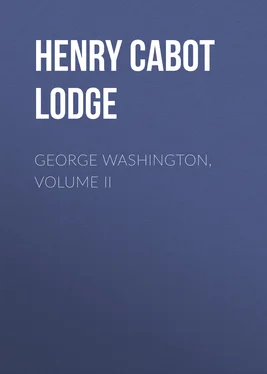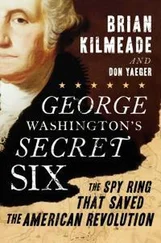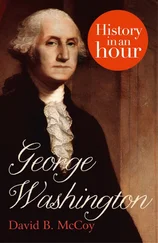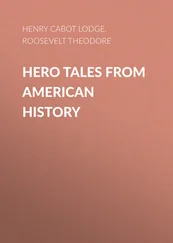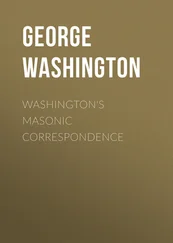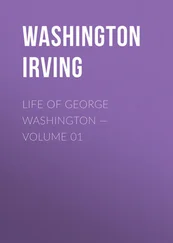Henry Cabot Lodge - George Washington, Volume II
Здесь есть возможность читать онлайн «Henry Cabot Lodge - George Washington, Volume II» — ознакомительный отрывок электронной книги совершенно бесплатно, а после прочтения отрывка купить полную версию. В некоторых случаях можно слушать аудио, скачать через торрент в формате fb2 и присутствует краткое содержание. Жанр: Биографии и Мемуары, История, foreign_edu, foreign_antique, foreign_prose, на английском языке. Описание произведения, (предисловие) а так же отзывы посетителей доступны на портале библиотеки ЛибКат.
- Название:George Washington, Volume II
- Автор:
- Жанр:
- Год:неизвестен
- ISBN:нет данных
- Рейтинг книги:5 / 5. Голосов: 1
-
Избранное:Добавить в избранное
- Отзывы:
-
Ваша оценка:
- 100
- 1
- 2
- 3
- 4
- 5
George Washington, Volume II: краткое содержание, описание и аннотация
Предлагаем к чтению аннотацию, описание, краткое содержание или предисловие (зависит от того, что написал сам автор книги «George Washington, Volume II»). Если вы не нашли необходимую информацию о книге — напишите в комментариях, мы постараемся отыскать её.
George Washington, Volume II — читать онлайн ознакомительный отрывок
Ниже представлен текст книги, разбитый по страницам. Система сохранения места последней прочитанной страницы, позволяет с удобством читать онлайн бесплатно книгу «George Washington, Volume II», без необходимости каждый раз заново искать на чём Вы остановились. Поставьте закладку, и сможете в любой момент перейти на страницу, на которой закончили чтение.
Интервал:
Закладка:
It is interesting to observe the ease and certainty with which, in dealing with the central question, he grasped all phases of the subject and judged of the effect of the existing weakness with regard to every relation of the country and to the politics of each State. He pointed out again and again the manner in which we were exposed to foreign hostility, and analyzed the designs of England, rightly detecting a settled policy on her part to injure and divide where she had failed to conquer. Others were blind to the meaning of the English attitude as to the western posts, commerce, and international relations. Washington brought it to the attention of our leading men, educating them on this as on other points, and showing, too, the stupidity of Great Britain in her attempt to belittle the trade of a country which, as he wrote Lafayette in prophetic vein, would one day "have weight in the scale of empires."
He followed with the same care the course of events in the several States. In them all he resisted the craze for issuing irredeemable paper money, writing to his various correspondents, and urging energetic opposition to this specious and pernicious form of public dishonesty. It was to Massachusetts, however, that his attention was most strongly attracted by the social disorders which culminated in the Shays rebellion. There the miserable condition of public affairs was bearing bitter fruit, and Washington watched the progress of the troubles with profound anxiety. He wrote to Lee: "You talk, my good sir, of employing influence to appease the present tumults in Massachusetts. I know not where that influence is to be found, or, if attainable, that it would be a proper remedy for the disorders. Influence is not government . Let us have a government by which our lives, liberties, and properties will be secured, or let us know the worst at once." Through "all this mist of intoxication and folly," however, Washington saw that the Shays insurrection would probably be the means of frightening the indifferent, and of driving those who seemed impervious to every appeal to reason into an active support of some better form of government. He rightly thought that riot and bloodshed would prove convincing arguments.
In order to understand the utter demoralization of society, politics, and public opinion at that time, the offspring of a wasting civil war and of colonial habits of thought, it is interesting to contrast the attitude of Washington with that of another distinguished American in regard to the Shays rebellion. While Washington was looking solemnly at this manifestation of weakness and disorder, and was urging strong measures with passionate vehemence, Jefferson was writing from Paris in the flippant vein of the fashionable French theorists, and uttering such ineffable nonsense as the famous sentence about "once in twenty years watering the tree of liberty with the blood of tyrants." There could be no better illustration of what Washington was than this contrast between the man of words and the man of action, between the astute leader of a party, the shrewd manager of men, and the silent leader of armies, the master builder of states and governments.
I have followed Washington through the correspondence of this time with some minuteness, because it is the only way by which his work in overcoming the obstacles in the path to good government can be seen. He held no public office; he had no means of reaching the popular ear. He was neither a professional orator nor a writer of pamphlets, and the press of that day, if he had controlled it, had no power to mould or direct public thought. Yet, despite these obstacles, he set himself to develop public opinion in favor of a better government, and he worked at this difficult and impalpable task without ceasing, from the day that he resigned from the army until he was called to the presidency of the United States. He did it by means of private letters, a feeble instrument to-day, but much more effective then. Jefferson never made speeches nor published essays, but he built up a great party, and carried himself into power as its leader by means of letters. In the same fashion Washington started the scheme for internal waterways, in order to bind the East and the West together, set on foot the policy of commercial agreements between the States, and argued on the "imperial theme" with leading men everywhere. A study of these letters reveals a strong, logical, and deliberate working towards the desired end. There was no scattering fire. Whether he was writing of canals, or the Mississippi, or the Western posts, or paper money, or the impost, or the local disorders, he always was arguing and urging union and an energetic central government. These letters went to the leaders of thought and opinion, and were quoted and passed from hand to hand. They brought immediately to the cause all the soldiers and officers of the army, and they aroused and convinced the strongest and ablest men in every State. Washington's personal influence was very great, something we of this generation, with a vast territory and seventy millions of people, cannot readily understand. To many persons his word was law; to all that was best in the community, everything he said had immense weight. This influence he used with care and without waste. Every blow he struck went home. It is impossible to estimate just how much he effected, but it is safe to say that it is to Washington, aided first by Hamilton and then by Madison, that we owe the development of public opinion and the formation of the party which devised and carried the Constitution. Events of course worked with them, but they used events, and did not suffer the golden opportunities, which without them would have been lost, to slip by.
When Washington wrote of the Shays rebellion to Lee, the movement toward a better union, which he had begun, was on the brink of success. That ill-starred insurrection became, as he foresaw, a powerful spur to the policy started at Mount Vernon, and adopted by Virginia and Maryland. From this had come the Annapolis convention, and thence the call for another convention at Philadelphia. As soon as the word went abroad that a general convention was to be held, the demand for Washington as a delegate was heard on all sides. At first he shrank from it. Despite the work which he had been doing, and which he must have known would bring him once more into public service, he still clung to the vision of home life which he had brought with him from the army. November 18, 1786, he wrote to Madison, that from a sense of obligation he should go to the convention, were it not that he had declined on account of his retirement, age, and rheumatism to be at a meeting of the Cincinnati at the same time and place. But no one heeded him, and Virginia elected him unanimously to head her delegation at Philadelphia. He wrote to Governor Randolph, acknowledging the honor, but reiterating what he had said to Madison, and urging the choice of some one else in his place. Still Virginia held the question open, and on February 3 he wrote to Knox that his private intention was not to attend. The pressure continued, and, as usual when the struggle drew near, the love of battle and the sense of duty began to reassert themselves. March 8 he again wrote to Knox that he had not meant to come, but that the question had occurred to him, "Whether my non-attendance in the convention will not be considered as dereliction of republicanism; nay, more, whether other motives may not, however injuriously, be ascribed for my not exerting myself on this occasion in support of it;" and therefore he wished to be informed as to the public expectation on the matter. On March 28 he wrote again to Randolph that ill-health might prevent his going, and therefore it would be well to appoint some one in his place. April 2 he said that if representation of the States was to be partial, or powers cramped, he did not want to be a sharer in the business. "If the delegates assemble," he wrote, "with such powers as will enable the convention to probe the defects of the constitution to the bottom and point out radical cures, it would be an honorable employment; otherwise not." This idea of inefficiency and failure in the convention had long been present to his mind, and he had already said that, if their powers were insufficient, the convention should go boldly over and beyond them and make a government with the means of coercion, and able to enforce obedience, without which it would be, in his opinion, quite worthless. Thus he pondered on the difficulties, and held back his acceptance of the post; but when the hour of action drew near, the rheumatism and the misgivings alike disappeared before the inevitable, and Washington arrived in Philadelphia, punctual as usual, on May 13, the day before the opening of the convention.
Читать дальшеИнтервал:
Закладка:
Похожие книги на «George Washington, Volume II»
Представляем Вашему вниманию похожие книги на «George Washington, Volume II» списком для выбора. Мы отобрали схожую по названию и смыслу литературу в надежде предоставить читателям больше вариантов отыскать новые, интересные, ещё непрочитанные произведения.
Обсуждение, отзывы о книге «George Washington, Volume II» и просто собственные мнения читателей. Оставьте ваши комментарии, напишите, что Вы думаете о произведении, его смысле или главных героях. Укажите что конкретно понравилось, а что нет, и почему Вы так считаете.
